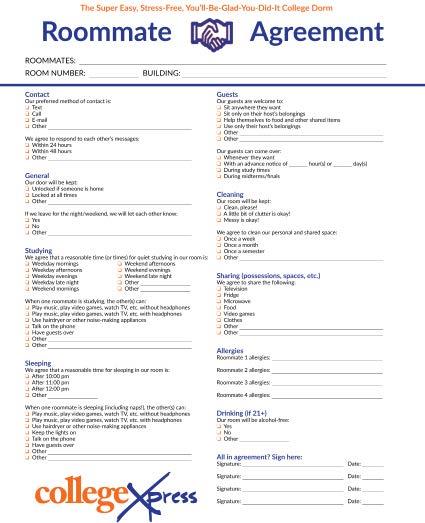
18 minute read
The Adjustment to College
Advice for the College Transition
By Amy Baldwin, Ed.D.
My son’s university is only 30 minutes away. He could easily commute from home but from the get-go made it clear he wanted to live on campus his first year. His dad and I supported this choice (even though I’m pretty sure it’s mostly about the “all-you-can-eat” dining hall options). And now it’s happening — Fall 2021 is here!
In addition to being a parent, I’m the Director of Student Transitions at a university where I work with first-year students — which makes me very familiar with the challenges they bump up against as they navigate new independence and responsibilities. Here’s how you can help!
Communicate Expectations
This is a tried and true tip. The more you and your student set clear expectations, the easier time they’ll have when they need to make decisions on their own.
Do you expect them to call or text regularly? You may ask that they check in at a certain day or time of the week. You may also ask them to let you know immediately if they are sick.
Do you expect them to let you know if they have a problem that they cannot manage? You may ask them to share what they’re doing to deal with challenges, or request that they ask you for help when they’re unsure what they should do next.
One discussion I’ve had with my own son is the “Don’t be afraid to tell me you are failing” conversation. This included subtopics like “How can you tell if you are failing?” and “What resources are available if you struggle in class?” As an educator, I know that he’ll have at least one challenging course this year, and I want the lines of communication wide open when it happens. He knows there will be no judgment, no shame, just support and advice (if he wants it).
Remind Them of Their Resources
Campus resources range from academic services, like tutoring, to health services, such as screenings and counseling. Grab that brochure, watch that informational video, and scour the website to learn more about what’s available. Then talk about these resources with your student as though they’re a normal and necessary part of every college student’s existence (because they are!).
Here are a few ways to do this:
• “Remember, if you’re not sure how to complete an assignment, visit with your professor. Upperclassmen do this all the time.” • “If you don’t feel well, make an online appointment at the health clinic so you can be seen immediately. Don’t wait until you feel worse.”
• “Stop by the tutoring center in the first few weeks and find a tutor who can help you with your courses. If you don’t need the tutor after all, you can use that time to study on your own.”
Take a Step Back
This suggestion has never been easy for some of us, and may be even harder knowing that there’s a lot at stake in how we manage our habits, behaviors and choices during the ongoing pandemic.
Stepping back doesn’t mean stepping out of the picture entirely. It means watching, waiting and encouraging your student to handle issues themselves first.
This is especially true when it comes to your student’s courses. A call to the department chair or email to the professor will not go over well — and possibly run afoul of the Family Education Rights and Privacy Act (FERPA). I’ve talked with students who were mortified that a parent had called me to ask about their grades. This tactic can undermine the progress your student is making in learning how to advocate for themselves.
Instead, coach your student on what to say and when to say it. As hard as it may seem, it’s better for them in the long run if they stumble a bit and pick themselves back up. Notice I didn’t say that it may be better for them to fall off a cliff. Of course, when extreme situations call for it, stepping in to help is appropriate.
Stay Flexible
Like it or not, during the pandemic we all had to get better at coping with change and uncertainty. With or without allyou-can-eat buffets, the “real” college experience is what your student makes of it — and by remaining flexible, you’ll be ready to support them through whatever comes their way.
Tips from Students on Making It Through

the First Year By Kate Gallop
Starting college is a huge adjustment. Here are some things my friends and I, all rising juniors, wish we’d known before our first year. Share these tips with your new college student!
1Manage Your Expectations
College is a hugely idealized time of life. Before move-in day, my expectations were loosely based on things my older friends and siblings said,
Instagram posts and movies: i.e., non-stop adventures with a fun group of friends.
When I didn’t have something happening every night, and didn’t always feel like myself, I assumed I was doing something wrong. I wish I’d known that I wasn’t. I wish I’d given myself the freedom to live in the moment without dwelling on pre-conceived notions of the “college experience.” It’s okay if you feel like you don’t relate to your peers instantly even when it seems like everyone else is. It takes time to adjust and make real friends.
2Make Time to Relax
At the beginning of my first semester, I was worried that if I took time to myself I’d miss out on something. There were definitely times when I should have said no to things but went anyway. I got sick the minute I arrived home for fall break and that’s when I realized I was burned out.
I started choosing to stay in when I felt tired instead of pushing myself to be involved 24/7. Whether it’s watching Netflix, reading a book or drawing, it’s important to check in with yourself and do the things that keep you relaxed. When I took a little time each week to be alone, I had more energy and the social events I attended became more enjoyable.
So remember, nothing is make or break. If you’re rundown, take a night off.
3Plan Out Your Time
Summer before freshman year, I worried that I wasn’t smart enough for college. This fear grew stronger as I sat through my first classes and leafed through syllabi, overwhelmed by the number of things I’d be responsible for throughout the semester.
Instead of panicking, I wrote down every assignment in a planner, noted the extra busy weeks, and attended all my classes. It turned out there was more than enough time to do everything I needed to. Good time management helped me stay on top of things and, slowly, college stopped feeling so drastically different from high school. I still took late nights to study for exams and finish papers, but I stopped believing I was out of place.
4Leave Some High School Attitudes at the Door
In high school, if a group of my friends got together without me, I’d take it personally. This changed completely in college. People tend to make plans based on who happens to be somewhere in the moment. You grab lunch with someone who has the same break between classes that you do, and go to dinner with residence hall floormates because you were already in the common room studying together. In high school, lunch is a major time to socialize. People look at you if you sit alone. This, too, changes in college. Everyone has different schedules, and oftentimes you won’t run into someone you know. It felt so freeing when I realized that no one notices or thinks anything less of someone sitting alone.
5Put Yourself Out There
While it’s perfectly normal to eat alone, it’s important to get to know people, and meals are a great way to do that. Some of the best advice I got before my first year is, when you meet someone you like talking to, ask for their number and make meal plans.
I knew no one at my college before movein day. As nervous as I was, I made sure to introduce myself to the other people moving in on my floor, and I’m so happy I did — it’s the easiest ways to make your dorm start to feel like home.
When you can, spend time in the dorm common room instead of your room because it’s a good way to meet friends. And if you don’t click with anyone on your floor, don’t worry. Clubs and classes are another great way to find people you have something in common with.
Begin the year ready to meet a ton of new people and excited about what comes next. It takes time for things to fall into place, but once you find a new routine and people you connect with, you’ll never want to leave.
An RA’s Best Tips for Helping Roommates Get Along By Cambria Pilger

Whether your student chose their roommate or is rooming with someone they never met, it can be intimidating to live in an unfamiliar place, away from home and surrounded by new people. Some first-year roommates become best friends, from day one of college through graduation. Others just try to get through the year (and hope they score a single room as a sophomore).
My own personal experience fell in the middle. I got along with my freshman roommate but we didn’t interact a lot outside of our room and that was fine. I decided to apply to be a Resident Assistant (RA) for sophomore year because I wanted to be challenged in my relationships, organize fun and creative events, and support the students living in my hall. I learned a lot as an RA and am happy to share my insights!
A roommate agreement is easy — and essential.
Most schools pair roommates based on common interests, but even in the best matches there’s room for conflict. Not surprisingly, living, sleeping and studying a few feet away from another person can lead to irritation and misunderstanding. Perhaps one roommate doesn’t clean their half of the room, stays up super late in the room talking to friends, or never actually leaves the room.
In these situations, one of the best tools students can turn to is a roommate agreement. The object is to lay out, early on, the rules each person wants to have for the room. How late is too late to have friends over? Are roommates allowed to borrow each other’s stuff? If one person has a complaint about the other, how should they communicate it (tell them, write a note, etc.)?
Whenever I was called in to help roommates work through an issue, one of my first questions was whether it was covered by their roommate agreement. If there was a clear violation, we could use the agreement as a starting point to resolve the conflict.
Take Kate and Emily. At the start of the year, they discussed their sleep routines and found that they both went to bed around 10. They agreed they’d be quiet if one of them stayed up later than the other. However, as the weeks passed, Kate’s sleep schedule shifted. She stayed up late studying or hanging out with friends in the room when Emily was trying to sleep. All I had to do was draw their attention to the roommate agreement. Kate and Emily talked it over and decided that, if either one of them stayed up later than the other, they should do so in one of the lounges or study rooms and respect their roommate’s sleep time.
Who is your student’s neutral support person?
Building relationships early in college is key. When a problem comes up, whether big or small, it’s helpful for students to have someone to talk to outside the situation. Maybe it’s an older student they know from a club or team, an athletic coach, or a teaching assistant in one of their classes who’s become a mentor. They can turn to this person to share what they’re going through, unload some of their emotions, and brainstorm a solution.
One of my hall residents relied on me in this way. Adam got along with his roommate most of the time, but when they did fight or argue, he’d come to me to talk through the situation and get a new perspective on it. I could offer a listening ear and advice without getting personally involved.
Luckily, in my hall I didn’t have to intervene too many times because students resolved their problems on their own — and this was ideal. Although as an RA I was there to support and guide residents (and if a problem was serious, I was ready to step in), my job was to empower them to defuse conflict on their own rather than referee every squabble.
My top recommendations for dealing with residence life and roommate challenges:
1. Use the resources.
There are so many, from residence life leadership and student success programs to faculty and staff support, friends and family. Especially during the first year, encourage your student to take advantage of these resources to work through uncertainty or conflict.
2. Make a connection.
Your student and their roommate may be very different people, with different habits and backgrounds. Finding things they have in common will help them strengthen their relationship and be more comfortable living with one another.
3. Talk honestly about disagreements.
Your student shouldn’t be afraid to talk to their roommate. After all, this is new territory for both of them. The flip side of this is being open to criticism or feedback from the roommate. A willingness to listen needs to come from both sides.
4. Don’t fume silently.
Address issues promptly instead of ignoring them. This could mean talking to the RA to design an action plan, being straight-up with their roommate about how they feel and suggesting a compromise, or learning to accept things as they are.
5. Know that there is never a single solution.
Every student and situation is unique. Remembering this is always the first step to solving problems and keeping peace with one’s roommate.
Roommate Agreements
My university’s Residence Life department passes out roommate agreements. If your student’s school doesn’t, they and their roommate can create one by discussing what’s important to them or use a template like this: images.collegexpress.com/article/ roommateagreement3.jpg. Rules may need to evolve as the year goes on, so your student and their roomie should be ready to revisit this conversation.


Coach Your Student to Communicate With Professors
By Amy Baldwin, Ed.D.

The student-professor relationship in college is one of the most important to cultivate. Professors want to develop strong relationships with their students, and students should want the same. Here are a few tips to guide your student through the process of creating an open line of communication with a professor.
Establish a Relationship Early
Professors will be happy to get to know your student before a problem arises. Any time during the semester (with the exception of the day before the final!) is a good time to reach out, but the sooner the better.
Your student should take cues from the syllabus about the best way to communicate with a professor. Is the professor available to meet in person or is email or an online meeting better? It goes without saying, but I’ll say it anyway: If the professor prefers email, then use email and check it often. When your student meets with the professor for the first time, it’s a good idea to have a list of questions ready. Here are a few that can help your student learn more about the professor’s expectations: • “I want to learn as much as I can in your class. What can I do to succeed?” • “I usually [fill in usual study practices]. What will work best for this class?” • “I want to be sure I start off with solid work in your class. Can I come see you before an assignment is due to make sure I’m on the right track?”
A solid relationship early in the semester can be helpful if your student’s circumstances change. When students moved home because of the pandemic, one of my students had to pick up extra shifts at his job and could no longer join our class online at the designated time. Another student was dealing with limited internet access. Faculty will want to know about any situation that makes it hard for a student to access their courses or show up to class if face-to-face sessions are held.
Create a Plan to Stay Organized
Now more than ever your student needs a planner, preferably a large one that can hang on a wall or anything that can be accessed easily. They can use their planners to: • Keep track of when classes meet • Enter exam and assignment due dates
• Schedule regular study hours • Keep track of club meetings, athletic practices, work shifts • Block out time to socialize when they don’t have other obligations
In college, students spend fewer hours in class than they did in high school but many more hours reading, studying and preparing for class, and this is a big change. Encourage your first-year student to take advantage of any time management workshops offered by their school (often through the Writing Center).
Seek Immediate Feedback After Graded Work
If your student gets an low or failing grade — even if they think they know why — it’s good to check in with the professor ASAP.
Here are a few ways to open that conversation:
• “I reviewed my work. Can we go over what I did wrong so I understand what I should do differently next time?” • “I’m bummed I messed up that assignment. Would you help me see where I made mistakes?”
• “Can we talk about how this low grade will affect my progress in the course? I want to be sure to make the improvements I need to raise my grade.”
Because students share this fear with me, it’s worth telling you: Yes, professors
really want to talk with students who’ve failed an assignment. No, they don’t think their students aren’t smart enough to pass their class.
Professors want their students to learn and to earn good grades. Your student shouldn’t be ashamed to speak to a professor about a class they’re struggling in. Reaching out demonstrates a willingness to improve.
Check Email!
Good email habits have become more important than ever during the pandemic with the increase in online classes and Zoom meetings. Institutions make important announcements and share updates via email and many professors prefer to communicate this way as well.
Students who don’t check email regularly quickly feel lost. Encourage your student to check their school email account at least once a day. It’s a simple habit that will serve them well all through college.
Support During Midterms and
Finals By CollegiateParent
The weeks between Thanksgiving and winter break are tough on students. No way to sugarcoat it. They are buried in work: reading, exam preparation, final projects, paper writing.
Some first-year students experience another wave of homesickness after Thanksgiving. Seniors are extra stressed as they work on theses and capstone projects while applying for jobs and graduate school. Oh, and it’s cold and flu season!
You may not hear from your student much, or at all. This is natural and most likely okay. They need space, but they also need encouragement and support. When you do talk, or in a letter or a text exchange, you can reinforce strategies for getting through finals healthy and whole. Here are tips to share.
Maximize academic support.
• As soon as final projects and papers are assigned, break them into smaller pieces and get started. • Put all these tasks into a master calendar or your planner and prioritize in order of importance. • Attend all available study sessions, faculty office hours, etc. • Get individual tutoring in subjects where you’re struggling.
Take care of yourself. This means:
• Get enough sleep. • Take short, frequent study breaks (you can put these in your planner). • Exercise — including outdoors in natural light if possible. • Spend quality time with friends (again, you can schedule this). • Eat healthy meals. • Stay hydrated (try not to rely too much on caffeine).
Encourage your student to keep their eye out for finals support events on campus at the student union, library, health center, etc. and reach out for stress relief through the counseling center.
What else can family members do?
Understand that your student may not have time for the usual phone calls. Send an occasional text/social message that doesn’t require a response. Check in to confirm their travel plans and offer to help if needed. And they’ll welcome a finals care package: • Healthy snacks (nuts, dried fruit, protein bars) • Fidget or stress relief toy • Cozy hat, gloves, scarf or slippers • New headphones or earbuds • Gift card for coffee shop or restaurant they like in town • Calming teas • Vitamin C drops or
Emergen-C




